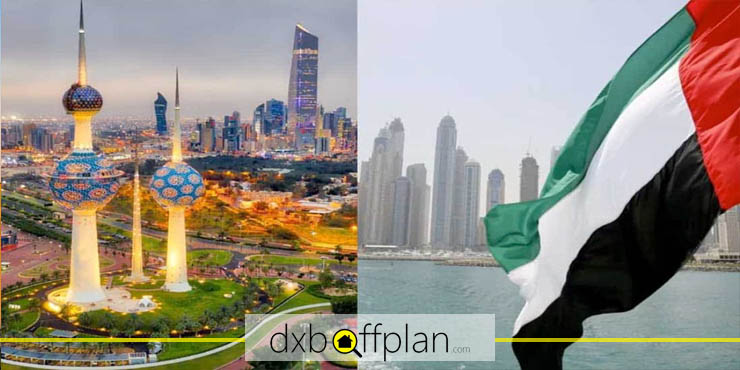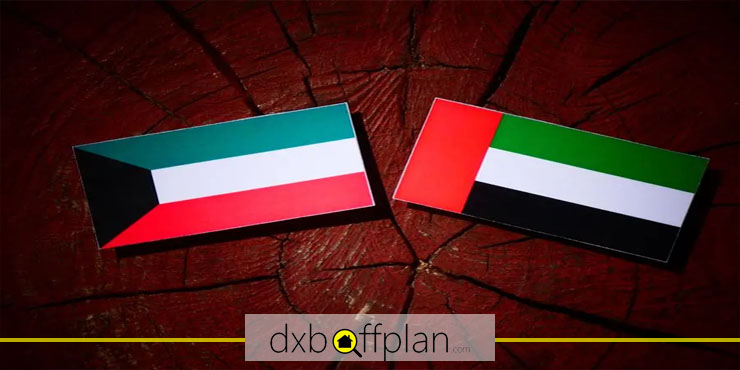Dubai vs. Kuwait: An In-Depth Investor’s Guide
In today’s rapidly changing world of business and finance, deciding on the optimal location in which to place foreign investments has now itself become a daunting task. In the Gulf region, two of the apparent targets of foreign investment, the global city of Dubai and the resource-rich Kuwait, both have their own characteristics, prospects, and issues.
Dubai with developed infrastructure, free economic policies, and international orientation is solidly established as the region’s economic and business capital. The city not only welcomes multinational companies and new-generation startups but also offers equal rights of ownership to the investors in several free zones. Kuwait with its oil economy, enormous treasury funds, and relatively stable economic environment is among the safest Middle Eastern markets to make investments in—although the business community has to be examined more rigorously on the matters of regulation and growth prospects.
In this article by Dxboffplan, we are going to explore how investing in Dubai and Kuwait differs on various factors like registration and ownership of companies, tax advantages, business prospects in various sectors, political and economic risks, and foreign investor’s experience. If you are concentrating on the Gulf market, this comparison will help you arrive at a more calculated decision regarding Dubai vs Kuwait real estate.
A Comparison Between the Economies of Dubai and Kuwait
Dubai and Kuwait are regarded as two of the strongest economies in the region of the Gulf but have developed differently. Dubai, as part of the United Arab Emirates, has diversified the economy, admitted foreign investment, and developed into a commercial, tourism, transportation, and technological hub. Kuwait, in contrast, has an oil-based economy with vast oil deposits and huge amounts of financial assets. Kuwait is also trying to diversify gradually by increasing sovereign wealth funds. These structural and strategic differences have direct implications on the nature of opportunities, incentives, and investment categories in both countries.
Dubai: Middle East’s Financial Capital
Dubai has, of late, become the symbol of economic transformation in the Middle East. Through the development of free economic zones, highly developed banking facilities, investor-conducive policies, and ultra-sophisticated infrastructure, Dubai has been able to entice foreign investment from all around the globe. Dubai has moved beyond traditional commerce and, through investing in high technology, innovation, tourism, and finance, has evolved into among the best economic centers of the world. Advanced airports, world connectivity, and relative political stability have rendered Dubai the best destination for long-term investment and multinationals as well.
Kuwait: Prosperous Energy based Economy
Kuwait possesses some of the world’s largest oil reserves and a stable, oil-based economy. The government’s oil export revenues are more than 90%, putting Kuwait on solid economic ground. Though well-positioned to diversify the economy, Kuwait is still dependent on the oil and gas sector. With assistance from sovereign wealth funds like the Future Generations Fund, the government is attempting to secure economic stability in the long term. In spite of having challenges in the form of bureaucracy, government dependency, and the low degree of economic reforms plaguing Kuwait’s investment climate, Kuwait still offers appealing opportunities—mainly in the oil and gas industry as well as in related services.
Legal and Regulatory Frameworks of Investment in Dubai and Kuwait
Investing in Dubai vs Kuwait is subject to special law that establishes the regime of law of dealing with foreign investors. Dubai has moved farther along in reforms and in liberalizing rules to facilitate more investment, but Kuwait has been more cautious and placed some restraints on foreign ownership and capital flow in some cases. Knowledge of the differences in law is essential to succeed in either economy.
Laws of Foreign Ownership in Dubai
A significant step towards permitting foreign investment was taken by Dubai by introducing new laws, including granting permission to own 100% of many sectors. Full ownership was not possible before either in free zones by foreign entities based outside the UAE. Now, even mainland businesses are allowed to be owned by foreigners in their entirety, provided the business activity is on the list of licensed activities. This big shift has enhanced the competitiveness of the environment and has created more of an incentive to invest in the emirate.
Laws of Foreign Investment in Kuwait
There are still some legal challenges to foreign investment in Kuwait. Foreigners typically need to have a Kuwaiti partner to set up business with, except in some cases where full ownership is granted by the Kuwait Direct Investment Promotion Authority (KDIPA). There have been some governmental measures to improve the investment climate, but bureaucracy, the many permits needed, and the slowness of the reforms are the primary challenges to foreign investment.
Dubai Vs Kuwait: Free Zones and Investors’ Rights
Here we discussed investors rights in each country separated by region:
Dubai Free Zones
Investment in free zones such as DIFC, JAFZA, and DMCC offers major benefits to foreign investors. Key advantages include:
- Tax relief
- 100% foreign ownership
- Simplified company registration processes
These zones have been highly effective in attracting international businesses.
Investor rights in Dubai, especially within free zones, are:
- Better safeguarded
- More transparent
These advantages position Dubai as a top choice for global investors.
Kuwait Free Zones
Limited number of free zones, with fewer incentives for foreign investors. Lacks:
- Comprehensive tax benefits
- Widespread full ownership opportunities
- Streamlined business registration procedures
Investor rights are generally:
- Less transparent
- Less protected
As a result, Kuwait is less competitive than Dubai in attracting foreign investment.
Starting Business in Dubai vs. Kuwait
Ease of doing business is among the key factors of foreign investment. Here we have compared both in terms of foreign ownership, registration and other criteria:
| Criteria | Dubai | Kuwait | Remarks |
| Foreign Ownership | Up to 100% in many sectors | Restricted, requires local partner | Dubai more investor-friendly |
| Company Registration | Fast, online process | Lengthy, more paperwork | Dubai is faster and more efficient |
| Free Zones | Many, with full ownership and tax benefits | Few, limited benefits | Dubai offers wider options |
| Administrative Process | Streamlined and digital | Bureaucratic and complex | Dubai provides ease of entry |
As you see, Dubai excels in that regard with electronic processes, speedy licensing, and integrated services and is the number-one country in the region. Kuwait, in attempting to simplify business registration, nonetheless requires compliance with more complicated administration involving several government authorities. This has seen the majority of foreign investors opt to use Dubai as their business gateway. Here’s a closer look:
Company Registration in Dubai
Dubai registration is typically straightforward and quick. People can get their business registered within days via web sites or consultancy offices. Registration is possible in free-trade areas, on the mainland, or offshore depending on the nature of the business. The key advantages are foreign ownership of 100%, tax-free areas, proximity to world markets, and world-class commercial infrastructure. The smooth systems of law and administration of Dubai are reassuring to businesses and entrepreneurs as well.
Establishing a Company in Kuwait
Venturing into business in Kuwait still involves time-consuming bureaucratic processes. Multiple documentation is required to be submitted by the investor, approval is to be obtained from several entities, and in general, the investor requires a Kuwaiti sponsor. While it has tried to simplify the process and offers complete ownership of some projects, Kuwait’s registration of companies is more and takes more time compared to Dubai. This is discouraging to those who are ready to venture into business in a hurry and independently.
Best Country for Real Estate Investment: Dubai vs Kuwait
Dubai and Kuwait are bringing in both local and foreign investors in their respective property markets due to several reasons. Dubai, with rising demand and liberal property ownership policies, draws both foreign and local investors and offers them foreign surroundings to invest in property. Kuwait, with economic stability and growing demand for household and commercial infrastructure, is a secure option to invest in property in the long term. Let us now discuss property prices in Dubai Vs Kuwait and explore risk factors as well:
| Feature | Dubai (2025) | Kuwait (2024–25) |
| Price Growth Forecast | 5–10% (up to 9.9% in prime areas) | 3–7% growth; up to 15% in early 2024 |
| Avg. Apartment Price/m² | AED 10,000–40,000 (~USD 2,700–10,900) | KWD 950–1,100 (~USD 3,100–3,700) |
| Avg. Villa Price/m² | AED 30,000–45,000 (~USD 8,200–12,250) | KWD 1,150–1,250 (~USD 3,750–4,100) |
| Avg. Apartment Price | AED 2.1M–2.3M (~USD 570k–625k) | Typically lower; varies by district |
| Rental Yields | 5–8% annual return | Lower (data limited); stable but conservative |
| Risks | Oversupply risk mid-term, potential price correction | Bureaucracy, limited investor access, lower liquidity |
As you see, both of them offer different opportunities, though of different nature and risk. Let’s explore each in more details below:
Investment in Dubai Real Estate
Investment in Dubai is one of the world’s top property markets that is appealing to property buyers. Here’s why:
- 100% foreign ownership available for property investors in Dubai
- Hassle-free and flexible payment plans
- Relatively low rental prices compared to similar markets
- Rapid population growth driving housing demand
- Continuous development of high-end real estate projects
- Dubai’s strong international reputation as a global city
Real Estate Investment in Kuwait
Kuwait’s property market has been more restricted and limited to Kuwait nationals in the past. With growing population and expansion needs in the residential sector, room to be involved in schemes of expansion is now emerging. Here’s what you need to know:
- Commercial and industrial properties still offer potential
- Medium- to long-term profit opportunities exist
- Kuwait remains a viable option for serious investors despite limitations
Investment Prospects in Kuwait and Dubai
Dubai and Kuwait are both appealing to foreign investors, but with distinct focal areas. Dubai has an open and diversified economy with investment potential in property, travel and tourism, electronics and technology, and foreign service. Kuwait is based on oil reservoirs and finance infrastructure with more potential in the energy sector, finance, and special industry manufacturing. Being familiar with these differences allows the investor to make better, targeted choices.
Dubai vs Kuwait: Real Estate, Tourism, and Technology
When it comes to Dubai vs Kuwait real estate, we all know that Dubai boasts one of the region’s busiest property markets. That is particularly true in Dubai free zones, which is where investment is highly preferred. The city’s list of tourist spots, state-of-the-art infrastructure, and international events all contribute to it being the perfect place to invest in tourism. In the last few years, the rapidly changing technology sector and huge government assistance to startups have also transformed Dubai into a hotbed of new and digital enterprises.
Oil, Finance, and Industry in Kuwait
Kuwait, blessed with the abundance of oil deposits, possesses different opportunities in the oil and gas sector and oil and gas-based enterprises. The banking sector of Kuwait, with its prominent banks and sovereign wealth funds, also provides financial investments. Kuwait’s government is attempting to encourage industrial units and decrease reliance on oil by issuing incentives and making industrial and manufacturing investments more and more desirable.
Return on Investment (ROI) in Dubai vs Kuwait
The return on investment in Dubai is particularly robust in the real estate, technology, and tourism sectors. Here we have compared the two regions in terms of ROI and market characteristics:
| Location | Average ROI (%) | Market Characteristics |
| Dubai | 7% – 10% | High demand, international appeal, investor incentives |
| Kuwait | 3% – 5% | Limited to locals, slower growth, long-term stability |
As you see, in some of the residential markets, the return on investment in Dubai is between 7% and 10% a year. This is both on account of the transparency of the market and the tax-free regime. However, although Kuwait is secure from the economic perspective and offers favorable prospects in the financial and oil sectors, the return on investment is less and gradual in comparison to Dubai. But it is a safe investment prospect for low-risk and long-term return on investment seekers. Ultimately, the choice of investing in Dubai vs Kuwait real estate comes back to your goals and ROI expectations.
Dubai vs Kuwait: Residency and Visa Benefits for Investment
Residency is the top priority of the majority of foreign investors when it comes to investing in Dubai vs Kuwait real estate. Dubai provides different investor and golden visa schemes to property buyers, entrepreneurs, and experts in specific professions. For example, property investment of predefined amounts entitles the investor to obtain long-term visas, allowing business and family migration with ease. Kuwait’s migration policies are not as expansive. Residence permits tend to be employment or locally sponsored, and Kuwait has less scope for granting long-term residencies to investors. This extreme difference tends to shift the pendulum in Dubai’s favour to the investor who is both looking to invest and migrate on a personal level.
Final Words
Dubai and Kuwait investment both have their own features, opportunities, and disadvantages. Dubai having a diversified open economy, investor friendly policies, and well-developed infrastructure is best suited to meet the ambitions of high growth, investment return, and access to international markets. Kuwait having an oil economy and financial security and investment opportunity in the oil and finance sector is best suited to conservative and long-term investment planners.
Ultimately, the decision of Dubai vs Kuwait real estate relies on your risk tolerance, and financial objectives.
If you want to invest in a stable economy with investor-friendly policies and huge potential in areas like property, tourism, and IT, Dubai is the intelligent and visionary choice. But if you are interested in low-risk investments in the more developed areas of banking and oil, Kuwait is another possibility.
For those who are eager to make investments in Dubai’s booming property sector, the key to making the right investment is gaining access to accurate information and expert advice. That is why we recommend taking advantage of the services we offer at Dxboffplan. We deal in Dubai property projects and offer free consultancy to choose the best among them based on your investment plan and budget. Take the next step with confidence now to design your future.
frequently asked questions
Yes, in the majority of free zones and even in some areas on the mainland, foreign investors can fully own.
Company registration in Dubai is easier and faster due to digital processes, several options, and efficient support.
Yes, especially in business sectors like oil, gas, and finance. While the returns are slower than in Dubai, they are more stable.










